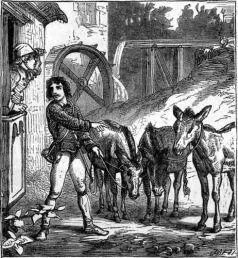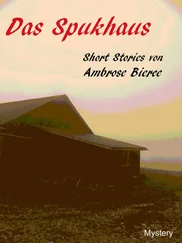Ambrose Bierce - Cobwebs from an Empty Skull
Здесь есть возможность читать онлайн «Ambrose Bierce - Cobwebs from an Empty Skull» весь текст электронной книги совершенно бесплатно (целиком полную версию без сокращений). В некоторых случаях можно слушать аудио, скачать через торрент в формате fb2 и присутствует краткое содержание. Жанр: Юмористическая проза, Классическая проза, на английском языке. Описание произведения, (предисловие) а так же отзывы посетителей доступны на портале библиотеки ЛибКат.
- Название:Cobwebs from an Empty Skull
- Автор:
- Жанр:
- Год:неизвестен
- ISBN:нет данных
- Рейтинг книги:4 / 5. Голосов: 1
-
Избранное:Добавить в избранное
- Отзывы:
-
Ваша оценка:
- 80
- 1
- 2
- 3
- 4
- 5
Cobwebs from an Empty Skull: краткое содержание, описание и аннотация
Предлагаем к чтению аннотацию, описание, краткое содержание или предисловие (зависит от того, что написал сам автор книги «Cobwebs from an Empty Skull»). Если вы не нашли необходимую информацию о книге — напишите в комментариях, мы постараемся отыскать её.
Cobwebs from an Empty Skull — читать онлайн бесплатно полную книгу (весь текст) целиком
Ниже представлен текст книги, разбитый по страницам. Система сохранения места последней прочитанной страницы, позволяет с удобством читать онлайн бесплатно книгу «Cobwebs from an Empty Skull», без необходимости каждый раз заново искать на чём Вы остановились. Поставьте закладку, и сможете в любой момент перейти на страницу, на которой закончили чтение.
Интервал:
Закладка:
His unthrifty brother, meanwhile, kept growing worse and worse. He was so careless of wealth-so so wastefully extravagant of lucre-that Johnny felt it his duty at times to clandestinely assume control of the fraternal finances, lest the habit of squandering should wreck the fraternal moral sense. It was plain that Charles had entered upon the broad road which leads from the cradle to the workhouse-and that he rather liked the travelling. So profuse was his prodigality that there were grave suspicions as to his method of acquiring what he so openly disbursed. There was but one opinion as to the melancholy termination of his career-a termination which he seemed to regard as eminently desirable. But one day, when the good pastor put it at him in so many words, Charles gave token of some apprehension.
"Do you really think so, sir?" said he, thoughtfully; "ain't you playin' it on me?"
"I assure you, Charles," said the good man, catching a ray of hope from the boy's dawning seriousness, "you will certainly end your days in a workhouse, unless you speedily abandon your course of extravagance. There is nothing like habit-nothing!"
Charles may have thought that, considering his frequent and lavish contributions to the missionary fund, the parson was rather hard upon him; but he did not say so. He went away in mournful silence, and began pelting a blind beggar with coppers.
One day, when Johnny had been more than usually provident, and Charles proportionately prodigal, their father, having exhausted moral suasion to no apparent purpose, determined to have recourse to a lower order of argument: he would try to win Charles to economy by an appeal to his grosser nature. So he convened the entire family, and,
"Johnny," said he, "do you think you have much money in your bank? You ought to have saved a considerable sum in nine years."
Johnny took the alarm in a minute: perhaps there was some barefooted little girl to be endowed with Sunday-school books.
"No," he answered, reflectively, "I don't think there can be much. There's been a good deal of cold weather this winter, and you know how metal shrinks! No-o-o, I'm sure there can't be only a little."
"Well, Johnny, you go up and bring down your bank. We'll see. Perhaps Charles may be right, after all; and it's not worth while to save money. I don't want a son of mine to get into a bad habit unless it pays."
So Johnny travelled reluctantly up to his garret, and went to the corner where his big tin bank-box had sat on a chest undisturbed for years. He had long ago fortified himself against temptation by vowing never to even shake it; for he remembered that formerly when Charles used to shake his, and rattle the coins inside, he always ended by smashing in the roof. Johnny approached his bank, and taking hold of the cornice on either side, braced himself, gave a strong lift upwards, and keeled over upon his back with the edifice atop of him, like one of the figures in a picture of the great Lisbon earthquake! There was but a single coin in it; and that, by an ingenious device, was suspended in the centre, so that every piece popped in at the chimney would clink upon it in passing through Charlie's little hole into Charlie's little stocking hanging innocently beneath.
Of course restitution was out of the question; and even Johnny felt that any merely temporal punishment would be weakly inadequate to the demands of justice. But that night, in the dead silence of his chamber, Johnny registered a great and solemn swear that so soon as he could worry together a little capital, he would fling his feeble remaining energies into the spendthrift business. And he did so.
FOUR JACKS AND A KNAVE.
In the "backwoods" of Pennsylvania stood a little mill. The miller appertaining unto this mill was a Pennsylvania Dutchman-a species of animal in which for some centuries sauerkraut has been usurping the place of sense. In Hans Donnerspiel the usurpation was not complete; he still knew enough to go in when it rained, but he did not know enough to stay there after the storm had blown over. Hans was known to a large circle of friends and admirers as about the worst miller in those parts; but as he was the only one, people who quarrelled with an exclusively meat diet continued to patronize him. He was honest, as all stupid people are; but he was careless. So absent-minded was he, that sometimes when grinding somebody's wheat he would thoughtlessly turn into the "hopper" a bag of rye, a lot of old beer-bottles, or a basket of fish. This made the flour so peculiar, that the people about there never knew what it was to be well a day in all their lives. There were so many local diseases in that vicinity, that a doctor from twenty miles away could not have killed a patient in a week.
Hans meant well; but he had a hobby-a hobby that he did not ride: that does not express it: it rode him. It spurred him so hard, that the poor wretch could not pause a minute to see what he was putting into his mill. This hobby was the purchase of jackasses. He expended all his income in this diversion, and his mill was fairly sinking under its weight of mortgages. He had more jackasses than he had hairs on his head, and, as a rule, they were thinner. He was no mere amateur collector either, but a sharp discriminating connoisseur . He would buy a fat globular donkey if he could not do better; but a lank shabby one was the apple of his eye. He rolled such a one, as it were, like a sweet morsel under his tongue.
Hans's nearest neighbour was a worthless young scamp named Jo Garvey, who lived mainly by hunting and fishing. Jo was a sharp-witted rascal, without a single scruple between, himself and fortune. With a tithe of Hans's industry he might have been almost anything; but his dense laziness always rose up like a stone wall about him, shutting him in like a toad in a rock. The exact opposite of Hans in almost every respect, he was notably similar in one: he had a hobby. Jo's hobby was the selling of jackasses.
One day, while Hans's upper and nether mill-stones were making it lively for a mingled grist of corn, potatoes, and young chickens, he heard Joseph calling outside. Stepping to the door, he saw him holding three halters to which were appended three donkeys.
"I say, Hans," said he, "here are three fine animals for your stud. I have brought 'em up from the egg, and I know 'em to be first-class. But they 're not so big as I expected, and you may have 'em for a sack of oats each."
Hans was delighted. He had not the least doubt in the world that Joe had stolen them; but it was a fixed principle with him never to let a donkey go away and say he was a hard man to deal with. He at once brought out and delivered the oats. Jo gravely examined the quality, and placing a sack across each animal, calmly led them away.

When he had gone, it occurred to Hans that he had less oats and no more asses than he had before.
"Tuyfel!" he exclaimed, scratching his pow; "I puy dot yackasses, und I don't vos god 'im so mooch as I didn't haf 'im before-ain't it?"
Very much to his comfort it was, therefore, to see Jo come by next day leading the same animals.
"Hi!" he shrieked; "you prings me to my yackasses. You gif me to my broberdy back!"
"Oh, very well, Hans. If you want to crawfish out of a fair bargain, all right. I'll give you back your donkeys, and you give me back my oats."
"Yaw, yaw," assented the mollified miller; "you his von honest shentlemans as I vos efer vent anyvhere. But I don't god ony more oats, und you moost dake vheat, eh?"
And fetching out three sacks of wheat, he handed them over. Jo was proceeding to lay these upon the backs of the animals; but this was too thin for even Hans.
Читать дальшеИнтервал:
Закладка:
Похожие книги на «Cobwebs from an Empty Skull»
Представляем Вашему вниманию похожие книги на «Cobwebs from an Empty Skull» списком для выбора. Мы отобрали схожую по названию и смыслу литературу в надежде предоставить читателям больше вариантов отыскать новые, интересные, ещё непрочитанные произведения.
Обсуждение, отзывы о книге «Cobwebs from an Empty Skull» и просто собственные мнения читателей. Оставьте ваши комментарии, напишите, что Вы думаете о произведении, его смысле или главных героях. Укажите что конкретно понравилось, а что нет, и почему Вы так считаете.





